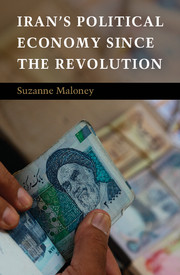Book contents
- Frontmatter
- Contents
- 1 Introduction
- 2 The Prelude: The Political Economy of Prerevolutionary Iran
- 3 The Economics of Upheaval, 1977–1980
- 4 The Cost of the Sacred Defense, 1980–1989
- 5 The Reconstruction Jihad, 1989–1997
- 6 Ayatollah Gorbachev: Reform within the Red Lines, 1997–2005
- 7 Populism, Version 2.0: The Ahmadinejad Era, 2005–2013
- 8 Energy and the Islamic Republic
- 9 Sanctions and the Sacred State
- 10 Conclusion
- Appendix
- Selected References
- Index
10 - Conclusion
Published online by Cambridge University Press: 05 August 2015
- Frontmatter
- Contents
- 1 Introduction
- 2 The Prelude: The Political Economy of Prerevolutionary Iran
- 3 The Economics of Upheaval, 1977–1980
- 4 The Cost of the Sacred Defense, 1980–1989
- 5 The Reconstruction Jihad, 1989–1997
- 6 Ayatollah Gorbachev: Reform within the Red Lines, 1997–2005
- 7 Populism, Version 2.0: The Ahmadinejad Era, 2005–2013
- 8 Energy and the Islamic Republic
- 9 Sanctions and the Sacred State
- 10 Conclusion
- Appendix
- Selected References
- Index
Summary
“Close your eyes. This is Tehran,” an Iranian newspaper aligned with the reform movement inveighed its readers in April 2013. “This is Tehran in 92 [the Iranian year that began in March 2013], and second and third class fruits and vegetables and, of course, waste have become popular.” What was then a wearied, cautious debate on the economy and the toll of sanctions erupted just a few weeks later, when the campaign to replace Ahmadinejad began in earnest. After the 2009 upheaval, many observers anticipated the 2013 election to showcase an anodyne campaign as a display of mindless deference to the regime's ideological strictures – a Potemkin pageant to confirm a new unquestioning acolyte to Khamenei in the post of the presidency. Instead, something within Iran's mercurial system gave way, and the Islamic Republic's carefully stage-managed electoral process mutated into a serious dialogue on the crisis facing the country and a newfound popular relegitimization of a system that only four years earlier had made a mockery of its own democratic pretensions.
The campaign included a number of surprising twists, including the early rejection of Hashemi Rafsanjani's bid to contest the presidency once again. However, the most striking aspect of the entire process was the instigation of an unprecedented public questioning of the regime's nuclear diplomacy, focused on the costs of the impasse to Iran's economy. The issue was highlighted during a lengthy televised debate on foreign policy that took place only a week before the election, with approximately two-thirds of the country watching. The rival candidates assailed the presumptive front-runner, the nuclear negotiator Saeed Jalili, for failing to resolve the issue or deter the intensification of sanctions. Former nuclear negotiator Hassan Rouhani defended his own negotiating track record, previously much criticized by hard-liners, and deployed a well-practiced riposte that questioned the utility of spinning centrifuges when factories are idled.
The debate was far more significant than simply another sharpel bowed display by an elite known for its fractiousness.
- Type
- Chapter
- Information
- Iran's Political Economy since the Revolution , pp. 491 - 508Publisher: Cambridge University PressPrint publication year: 2015



